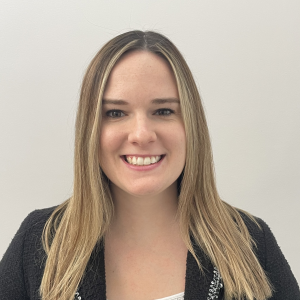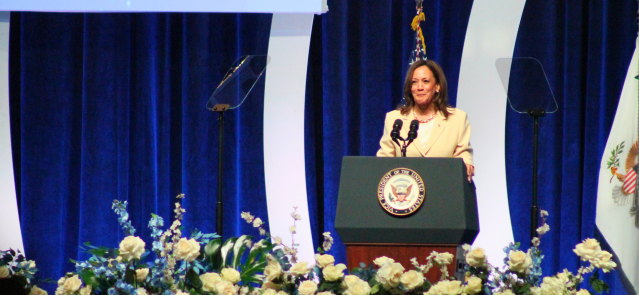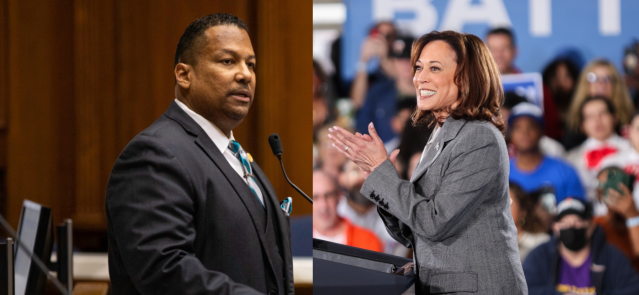Stay ahead of the curve as a political insider with deep policy analysis, daily briefings and policy-shaping tools.
Request a DemoTreasurer Elliott explains his plans to keep the new ESG policy from becoming a ‘witch hunt’
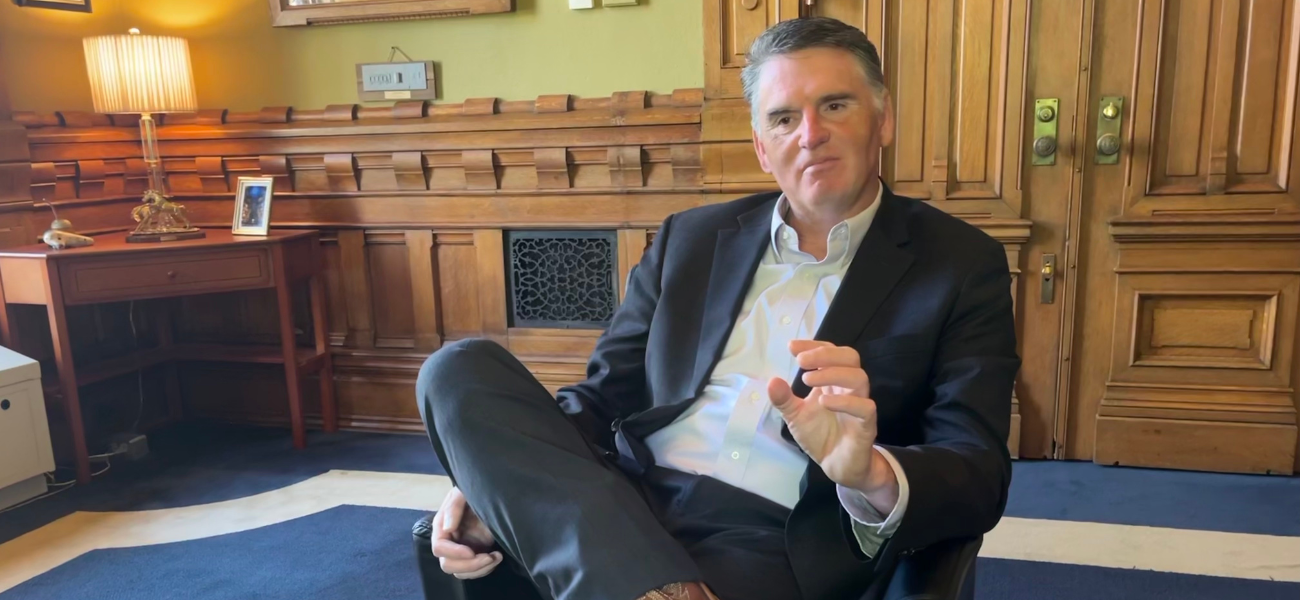
Indiana Treasurer Daniel Elliott speaks during a 2023 interview. (Credit: Kaitlin Lange)
He calls himself the “nerdy cowboy” — wearing boots with his suit and winning his election, in part, by driving his truck to far, less-populated corners of the state.
State treasurer Daniel Elliott, a farm owner from Morgan County, took over the Indiana Treasurer of State office at the start of the year, but he’s been involved in politics for about a dozen years. First as a precinct committeeman and then as a GOP county chair, county councilman and president of the local redevelopment commission.
Still, he viewed himself as an underdog when seeking the Republican nomination for treasurer last year against three other candidates because he came from a less-populated area, just outside of Morgantown.
During his first legislative session in office, Elliott has drawn attention for his more controversial focus on cracking down on environmental, social and governmental investing — known as ESG — in the state, but he’s also spent some time highlighting issues important to Hoosiers from rural parts of the state.
State Affairs sat down with Elliott to talk about his first few months in office, how the state’s new ESG policy will work and his 2018 fight against party insiders regarding the GOP’s platform.
The conversation has been edited for clarity, brevity and length.
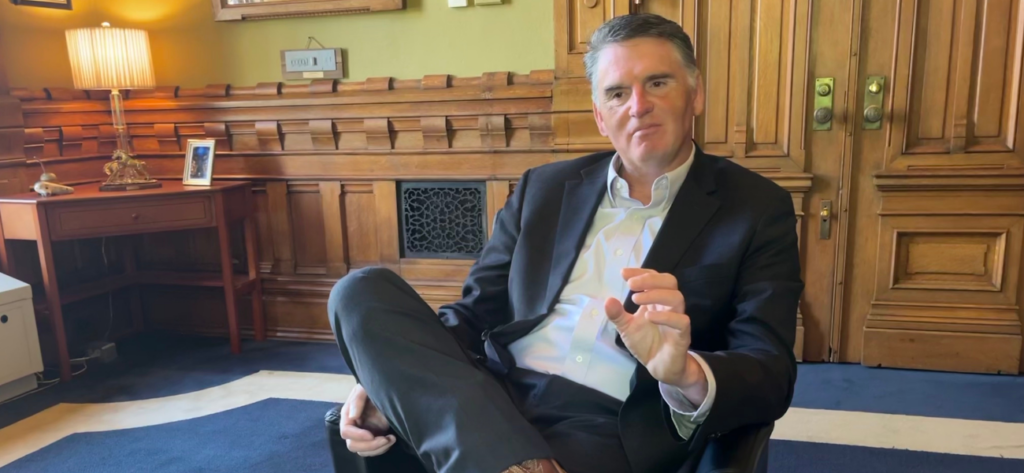
Why should the average Hoosier care about what the state treasurer does? It sounds fairly wonky.
It is. I jokingly call myself the nerdy cowboy because I am.
You look at the main role of the treasurer, chief investment officer. Some of the issues that are going on right now in the nation, in the world and in our country really require someone who’s willing to dig into the details. Being a software engineer by trade, that is my nature. I find elegance in numbers.
[One example that benefits Hoosiers is we work with] 911. I’m the only treasurer in the country that chairs the 911 system.
[Another example is] the Indiana Bond Bank. Coming from rural Indiana, big communities don’t worry about financing. You take Hamilton County, my friends over there, great people. They have such great credit. They have so much revenue coming in. They are very well suited to work on what they need to get done.
Rural small towns need resources like the Indiana Bond Bank to help them be able to accomplish some of their goals, whether it be trying to get broadband into their communities or trying to fix a water supply situation.
Can you explain what the Indiana Bond Bank is?
Bonds are loans for municipalities and local governments. The Indiana Bond Bank is oftentimes the lender of last resort. One of my goals is to make the bond bank one of the first tools that local governments come to.
When session started, I naturally assumed my role was to go and talk to legislators about the issues that my office found important. I found people telling me, wait a minute, you’re not supposed to do that. You’re supposed to go through lobbyists. I’m like, ‘Why? Why can’t I?’ And that’s something I tend to always ask is, ‘Why?’ So I started saying, ‘Well, these are the issues that I find important.’
One of the things I was concerned about when it comes to rural Indiana was not just the rural communities, but also hospitals. Health care is a big issue these days, and rural hospitals have a hard time competing with the big monopolistic nonprofits. So I started saying, ‘How can we help rural communities through the Bond Bank?’ The Bond Bank only had the ability to do bonds or loans for 10 years. Most big projects need a much larger runway— 20 or 25 years. So I presented that idea to the leadership. That bill passed.
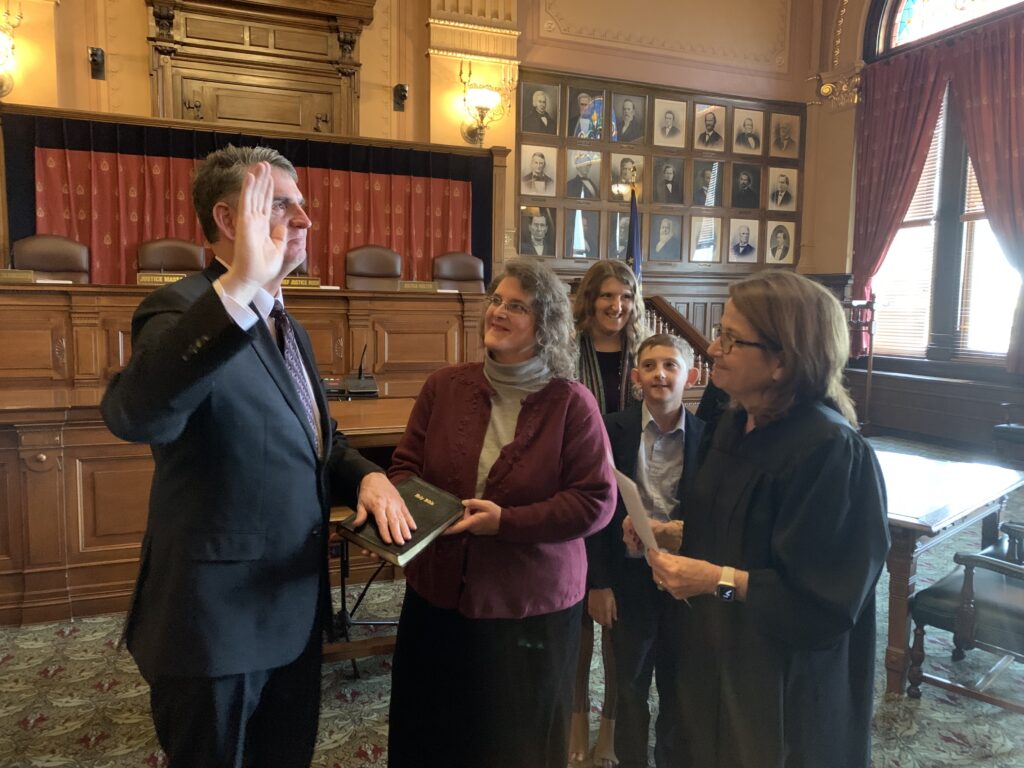
You wouldn’t think the treasurer’s office would be involved in finding solutions for health care problems.
That’s what’s fascinating about this job, and now you see why I’m having so much fun.
[We also offer] 529 plans, helping kids go to college. To me that’s really important because I grew up in Nebraska, Indiana. I’m the first one in my family ever to go to college and I grew up really poor. I didn’t get the chance to do Little League or swim practice or [Boy] Scouts like other kids, like my own kids got to do.
I spent my weekends and my summers helping my dad, who was a laborer. I remember one day, pushing a wheelbarrow of cement. I was 11 years old, the age of my youngest son right now, and I remember thinking, this stinks. There’s no way I want to do this the rest of my life. I need to go to college. Now 529 plans give kids an opportunity and parents an opportunity to actually start saving for that.
You see there’s a Millennium Falcon [model on my desk]. So if I’m not pointing out how geeky I am, I am 100% a geek. The reason I have that is we’re a small office and we say we’re a ragtag group of rebels. Our mission is to blow up Death Stars because we’re smaller, more nimble.
There was a community in Fulton County; they spent all this money on a new 911 center, but they couldn’t get it to work. We got ATT and Motorola and everybody in the same room and said, ‘What’s going on?’ In two weeks, they got it resolved. I want to say it was because our office is super smart. All we did was get people who weren’t talking to each other, and kind of cut through the red tape.
That’s the blowing up of the Death Stars.
What’s been the most surprising part so far of your role five months in?
Honestly, it surprised me how much bureaucracy and red tape there is. I always ask, ‘Why?’ since I grew up in poverty. Why can’t I do this? And as a software engineer, you learn to ask why. You’ll have 15 mistakes before you get to the right solution, but that’s part of the process.
I find that in state government, people are not always comfortable when a statewide elected official says, ‘Why are we doing it this way? Is there a reason?’ Sometimes there’s a very good reason, but if not, why can’t we do it differently? It’s gotten me in trouble a little bit. But we’ve also gotten some things done.
When you say that’s gotten you in trouble, what do you mean?
What I mean, is people [say] that’s not the way you’re supposed to do this. I think people expect me to sit behind that desk and then go to a few dinners and shake some hands. That’s not my style. I wear the suit because I want to be respectful to the state of Indiana, but generally if you want to see how Daniel normally dresses right there in jeans and cowboy shirt, me on my horse. When I’m not doing interviews, I’m usually wearing jeans. This weekend I spent my time brush hogging a field, because that’s just who I am.
One new law you haven’t touched on yet was the law limiting environmental, social, and corporate governance (ESG) investing. Why do you think it was important for House Bill 1008 to pass?
I truly believe in that issue. If we look at the markets you have a lot of investment fund managers who have been pushing policy, not just looking at the fiduciary reasons for why to invest. I am uncomfortable with that. Since I grew up in poverty you don’t ever escape that even though it’s not my experience now. You always know that’s in the back of your mind. I see family members, I see relatives, they’re surviving on pensions, that’s if they’re lucky. Many of them are surviving on just Social Security.
If you’re a wealthy person, you can afford to say, ‘I’m going to invest in such a way that maybe I won’t make as much money, but that’s okay because I’m going to feel good about my investments. I want to invest in the environment.’ That’s a great, absolutely worthy goal. I’m an outdoorsman. I love taking care of our planet, but at the same time, when you’re looking at somebody who has driven a highway truck for the county, someone who’s been a teacher, someone who has worked in these halls. I’ve got people in my office who have worked here for 30 years that are hardworking, great people. But they’re not millionaires. They’re not rich.
If they had to choose between paying for a mortgage and paying for medicine, then we’re doing something wrong. So in my mind, we all need to focus on what is the best return on investment; anything beyond that, then we’re not doing our duty.
Unfortunately, that’s been a trend the last decade or so, where there have been a lot of these ESG funds focusing on other issues, and I’m not saying those issues aren’t worthy. And if an ESG-focused fund makes money, it’s still the best return on investment.
That’s my role. I’m the chief investment officer, and I should be out there advocating for bringing the best return to the state of Indiana, and best return to [the Indiana Public Retirement System] as one of the board members.
Can you explain how this will work? What will the state do differently?
We have to be looking first and foremost at what’s the best return.
I always use a figurative ACME investment fund manager. If they say, ‘Hey, we have an ESG commitment. We’re part of XYZ ESG Alliance.’ They want to be carbon neutral by 2030 or something like that, we’re going to say since you’ve made that commitment, what you’re saying is you’re not looking at the financial [aspect]. You’re willing to take a hit on the return because of your political views. Your political views are, hey, we don’t like coal, or we don’t like fossil fuels. Okay, that’s fair. Lots of people have that philosophy, but the reality is, that means you’re going to get less of a return on your overall investment.
What we’re going to simply do is we’re going to present that to the [Indiana Public Retirement System] board members. Now, INPRS will look at who are the other companies that get similar returns and have similar fees. So let’s say ACME has a 6.2% return on their investment, but we can find a company that is similar that has a 6.8% return. That’s a better return. So we’re going to stop using ACME and we’re going to use the new company.
Now it could be that ACME company may actually have the best return and we say, ‘Sorry, we can’t find anybody comparable.’ That’s perfectly legitimate. So since we are focusing only on the financial return, then we’re going to say, ‘Well, we’re going to continue with ACME.’
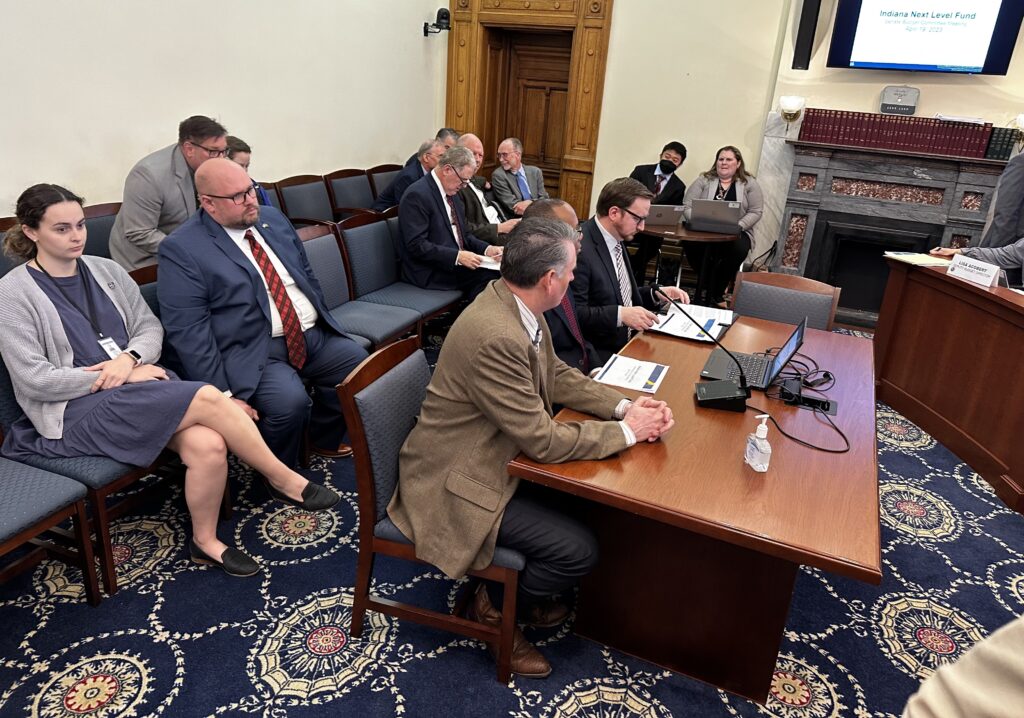
Have you started compiling a list of investment fund managers the state shouldn’t be using?
We’re working on the process first. The law doesn’t take effect until July 1, so we can’t do anything until then. I don’t want it to be a witch hunt. I want to say here’s the policy, and then this is how we’re executing the law. I want it to be fair across the board.
In 2018 you led the fight to keep the language in the Indiana Republican platform saying that marriage should be between a man and a woman. Is there a place for you to voice your opinion on social matters while serving in the treasurer’s office?
The office itself doesn’t get into social issues as much. It is a lot of numbers. But at the same time, I am who I am. I’m the first Latter Day Saint to hold statewide office.
I’m definitely not afraid to talk about my faith. I chose my faith. In fact, if you look in my office, there are lots of things about my faith here. That leatherbound book right there is a Book of Mormon in Spanish, the one that I used as a missionary in South America. I’m still bilingual which really freaks people out a lot. The last thing they expect is the cowboy from Morgan County to be bilingual.
Yes, I have my beliefs that I feel very strongly about. And I do believe that marriage is important. I do believe that just as a regular citizen I have the right, and I will exercise that right, to speak what I believe in.
Now, I also believe that while I have the right to speak about what I believe in, so do other people. One of the things that people especially talk about in 2018 that they forget is my whole point was advocating for having the discussion because there wasn’t going to be a discussion. Let’s have that conversation out in public.
There’s no doubt I’m a conservative. I’m not going to hide that.
That was a pretty bold push back then because you were fighting against party leadership on a controversial issue.Were you worried that it was going to impact any future political aspirations?
I wasn’t and here’s why. Obviously I want to try to serve. I want to try to be involved.
Honestly, I don’t expect to be in politics my whole life. This is my first time ever having politics as a full-time role. This might be the first and last moment I ever do that. If I go back to my farm, ride my horses and I start a new business when I’m done doing this, I’m perfectly content doing that. I’m not making any plans for the future either. I just want to be a really good treasurer right now. I’m having fun with this.
You’ve talked in detail about your rural Indiana roots. How important do you think it is to have an elected state official that comes from rural Indiana to give a voice to those portions of our state?
I think that’s really important. People who get elected, usually it’s a numbers game. They’re from Fort Wayne or Evansville or Indianapolis. They come from these areas where there are a large amount of people. We didn’t have anybody from rural Indiana.
That gives me the opportunity to be a voice for issues that folks who don’t live in rural Indiana or haven’t lived in rural Indiana since they were children [may not understand]. Like rural broadband, that is one of the most important things we as a state can be doing. Fortunately, we are working really hard at that. Take a child like me who grew up in rural Indiana, if they have broadband and they have the dreams to go to college someday, the tools are there. But if they don’t have broadband they’re already starting behind.
I look at it like electricity was 100 years ago. Can you imagine people living without electricity now? Of course not.
Everyone can now work from home. You could work for Google and live in Posey County and think about how that also is an amazing opportunity for small businesses to get started. When I started my business as a software engineer in Martinsville, Indiana, people were like nobody in Martinsville needs you. Well of course. My clients weren’t in Martinsville.
But at the same time, what did I get out of Martinsville? I got the ability — I remember when my wife and I picked our little farm 21 years ago — to raise my children. I always wanted my kids to be able to drive an old pickup truck to school and nobody would look at them sideways. My older son got to do that. He thought it was the coolest thing in the world to drive the old farm truck. It was rusty. It was loud. But he would drive that and he was just proud as punch. I will talk about horses all day long. My kids all got to show in 4H. My 11-year-old still shows in 4H.
Those of us who enjoy and choose a rural lifestyle, there’s no reason we can’t also be able to provide and have successful careers.
We obviously have a gubernatorial election coming up. Do you plan to endorse anyone?
Honestly, so far, the people running, I know them. They’re friends. So I’m going to let them have all the fun that I did and just focus on their races; and me, I’m going to focus on being state treasurer. At this point in time, I am not looking at getting involved in any races right now because I’m frankly kind of busy doing this.
Contact Kaitlin Lange on Twitter @kaitlin_lange or at [email protected].
Twitter @stateaffairsins
Facebook @stateaffairsin
Instagram @stateaffairsin
LinkedIn @stateaffairs
4 things to know about Braun’s property tax proposal
Sen. Mike Braun, the Republican candidate for Indiana’s governor, released a plan for overhauling property taxes Friday morning that would impact millions of Hoosiers, Indiana schools and local governments. “Nothing is more important than ensuring Hoosiers can afford to live in their homes without being overburdened by rising property taxes driven by rapid inflation in …
Bureau of Motor Vehicles looks to add new rules to Indiana’s driving test
The Bureau of Motor Vehicles wants to amend Indiana’s driving skills test, putting “existing practice” into administrative rule. Indiana already fails drivers who speed, disobey traffic signals and don’t wear a seatbelt, among other violations. Yet the BMV is looking to make the state’s driving skills test more stringent. A proposed rule amendment looks to …
In Indianapolis, Harris says she’s fighting for America’s future
Vice President Kamala Harris, the presumptive Democratic presidential nominee, told a gathering of women of color in Indianapolis on Wednesday that she is fighting for America’s future. She contrasted her vision with another — one she said is “focused on the past.” “Across our nation, we are witnessing a full-on assault on hard-fought, hard-won freedoms …
Indiana Black Legislative Caucus endorses Harris, pledges future support
The Indiana Black Legislative Caucus unanimously voted Wednesday to endorse Vice President Kamala Harris’ presidential run and will look at ways to assist her candidacy, the caucus chair, state Rep. Earl Harris Jr., D-East Chicago, told State Affairs. The caucus is made up of 14 members of the Indiana General Assembly, all of whom are …
